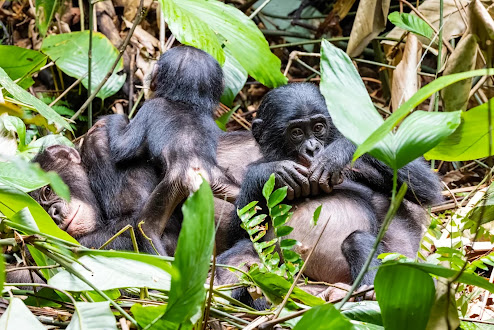 |
| Young bonobos as old as eight years suffer long-lasting stress after the birth of a sibling. Credit: MPI of Animal Behavior/ Christian Ziegler |
In any family, the birth of a child is a transformative event, often greeted with positive feelings from parents—and mixed feelings from siblings. The arrival of a new brother or sister, and the loss of parental attention that comes with it, is stressful for any first-born child. Now, scientists have shown that it is not just humans who have trouble becoming siblings. Bonobos, our closest living relatives, also experience stress in the transition to siblinghood. Following the birth of a sibling, young bonobos had five times higher levels of the stress hormone cortisol and a reduced immune response, which lingered for months. The international team of researchers behind the study were able to show that the stress response was due to the birth of siblings, and not to the natural weaning process that young bonobos inevitably go through. The study on wild bonobos, which is the first to investigate physiological changes in an animal as it transitions to siblinghood, reveals similarities between humans and bonobos—and an evolutionary history behind the stressful event of becoming a sibling.
Bonobos (Pan paniscus) are a species of great ape found only in the Congolese rainforest. Like humans, bonobos and other great apes take an unusually long time to reach independence. Bonobos rely on their mothers for food and protection for eight years and only reach full adulthood at 12 years. While in most animals, offspring are weaned before the mother gives birth to another infant. In bonobos, maturation is slow and the birth of another baby happens long before the older infant has become independent—setting the scene for sibling rivalry.
This overlap of dependent offspring raises an obvious question: how do the older siblings cope when newborns arrive? “Surprisingly, no study has investigated whether the arrival of a sibling takes a physiological toll on the older sibling,” says Verena Behringer, a scientist in the Endocrinology Laboratory at the German Primate Center and lead author of the study.
A first for sibling stress
To find out, researchers from the German Primate Centre, the University of Veterinary Medicine Vienna, and Max-Planck-Institutes at Leipzig and Konstanz studied the physiology and behavior of wild bonobos as they transitioned to siblinghood—the first study to do so in non-human animals. The study was conducted at the LuiKotale research station, a field site led by Barbara Fruth from the Max Planck Institute of Animal Behavior, where two habituated groups of bonobos have been monitored for 20 years. For more than 650 hours, researchers observed the behavior of 17 young animals between two and eight years that had become a sibling for the first time. At the same time, they collected 319 urine samples for physiological analyses from the bonobos before and after the birth of the sibling.
Importantly, the researchers had to confirm that any changes observed were actually caused by the birth of the sibling. "As the young animals grow up, there are various processes of social weaning or food change that can also stimulate stress reactions," says Barbara Fruth, co-author on the paper and a group leader at the Max Planck Institute of Animal Behavior. "These include, for example, that the young no longer suckle or is carried less after a certain moment. To disentangle the weaning process from sibling birth, we analyzed urine samples and behavioral observations before and after the birth of the sibling in the older bonobo and put them into perspective.”
Changes in behavior and body
What Behringer and co-authors found was not entirely unexpected: the arrival of the sibling triggered an increase of the stress hormone cortisol. However, what the research team did not anticipate was the extent of the stress response: cortisol rose five times above normal level and stayed elevated for seven months. At the same time, the researchers recorded a decline in neopterin, a marker that signals a change in the immune system.
“The birth of a sibling triggered high cortisol levels in all bonobos, regardless of whether the youngster was a highly dependent two-year-old or a mostly independent eight-year-old,” says Behringer. “This suggests that the stress response is not stimulated by energetic stressors, such as sudden end of suckling."
This conclusion was backed up by the recorded behavioral data. For example, the researchers observed the extent to which the older siblings were suckling, how much body contact they still had with their mother, and how often they were carried. All weaning processes, which can appear as additional stressors, were either completed before sibling birth, showed no sudden change with birth, or were only significant in young individuals and disappeared as the young bonobos grew older.
“It is not uncommon to see an older infant freak-out when the mother focusses her attention on a newborn,” says Fruth. “But our new study reveals a physiological basis to the stress that young bonobos experiences with the birth of a sibling.”
The results, then, raise an evolutionary question: given that siblinghood is so common, why is there stress associated with it at all?
“It may be that the hormonal challenge primes immatures to develop a stress resistance, making them fit for upcoming events later in life,” says Andreas Berghänel, coauthor of the study from the University of Veterinary Medicine Vienna. Behringer adds that siblings have benefits too: “After all, younger siblings are not only competitors, but they are also important social partners who have a positive influence on our development."
Verena Behringer, Andreas Berghänel, Tobias Deschner, Sean M Lee, Barbara Fruth, Gottfried Hohmann, "Transition to siblinghood causes a substantial and long-lasting increase in urinary cortisol levels in wild bonobos." journal eLife
Source/Credit: Max-Planck-Gesellschaft
vet092822_01







.jpg)